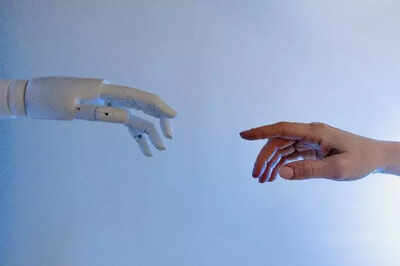Latest Education news – Board Exam Results, Admit Cards, Exam Paper Analysis and Question Papers | Times of India
As artificial intelligence continues to reshape industries, streamline workflows, and even outperform humans in certain analytical tasks, one looming question grips professionals across the globe: Will my job be next? It’s a fair concern. Automation is no longer a distant concept; it’s here, learning faster and acting quicker. Yet, even in this era of machine efficiency, not all careers are equally vulnerable. In fact, some roles remain deeply rooted in qualities machines simply can’t replicate—intuition, empathy, ethics, and emotional intelligence.While AI excels at processing data, detecting patterns, and handling repetitive tasks with remarkable precision, there are still professions that require something more—humanity. These are the roles that resist automation not by chance, but by design. They demand presence, perspective, and the kind of decision-making that algorithms can’t mimic.Here are ten such careers where the human element is irreplaceable—and likely to stay that way.
Lawyers
The practice of law is not just about interpreting statutes; it’s about applying them with nuance. Legal professionals must consider context, societal impact, and ethical dimensions in ways AI can’t. Whether negotiating a deal or defending a client in court, the human ability to persuade, empathize, and reason remains indispensable.
Medical and healthcare managers
Healthcare is more than a science, it’s a service. While AI tools assist in diagnostics and logistics, the leadership and interpersonal care required in managing health services depend on human sensitivity. From navigating patient concerns to guiding multidisciplinary teams, these roles demand emotional intelligence and ethical judgment.
Human resources professionals
People don’t come with code. HR professionals navigate personal dynamics, resolve conflicts, and foster workplace culture, tasks that require trust, confidentiality, and empathy. Hiring decisions, mental health support, and performance coaching are realms where emotional cues and social context are crucial.
Teachers and educators
AI can deliver information, but it can’t inspire curiosity, build confidence, or recognize the subtle learning needs of every student. Educators tailor their approach not just to syllabi, but to personalities and potential. The classroom remains one of the few places where human connection drives transformation.
Psychologists and counselors
Mental health care is among the most intimate forms of support one can offer—and receive. It involves navigating trauma, understanding subconscious cues, and building a therapeutic alliance. No AI, no matter how advanced, can replicate the trust and connection forged in these deeply human relationships.
Journalists and creative writers
While AI can generate text, creativity remains a human forte. Journalists investigate, question authority, and craft narratives with cultural and emotional resonance. Writers, whether working on novels, screenplays, or essays, bring depth, satire, and storytelling instincts that no algorithm can authentically duplicate.
Social workers
At the frontline of human struggle, social workers engage with individuals and families facing some of life’s most difficult challenges. This work involves compassion, negotiation, and cultural sensitivity—none of which can be programmed. AI may assist with administrative aspects, but the heart of this profession beats human.
Designers and visual artists
Design isn’t just about aesthetics—it’s about vision, emotion, and communication. While AI can generate templates and styles, understanding a client’s story, cultural background, and emotional goals requires creative interpretation. True design is an exchange between creator and audience, shaped by feelings, not formulas.
Leaders and executives
Leadership goes far beyond decision trees and data analytics. It requires vision, moral clarity, and the ability to inspire. Executives must navigate ambiguity, balance short-term pressures with long-term goals, and build teams that thrive on trust and cooperation. AI can provide insights—but not wisdom.
Skilled tradespeople
Plumbers, electricians, carpenters, and other hands-on professionals work in dynamic, unpredictable environments that demand adaptability and on-the-spot problem-solving. These jobs involve not only physical skill but also communication with clients and situational awareness—qualities no robotic arm can fully match.Embrace AI, but stay humanThe AI revolution is not the enemy; it’s a tool. But knowing where it ends and where human brilliance begins is key to navigating the future. As technology accelerates, these careers remind us that the core of many professions is built on qualities no machine can master.Rather than fear AI, the goal should be to work alongside it, leveraging its capabilities while doubling down on what only humans can offer: Empathy, ethics, intuition, and creativity. In the end, the careers most resistant to AI aren’t just jobs, they’re human experiences.
#human #needed #jobs #wont #Times #India
